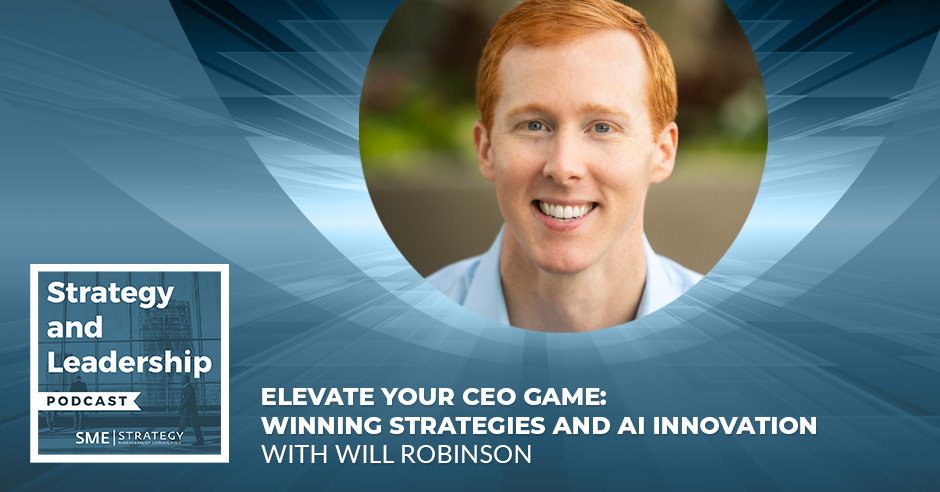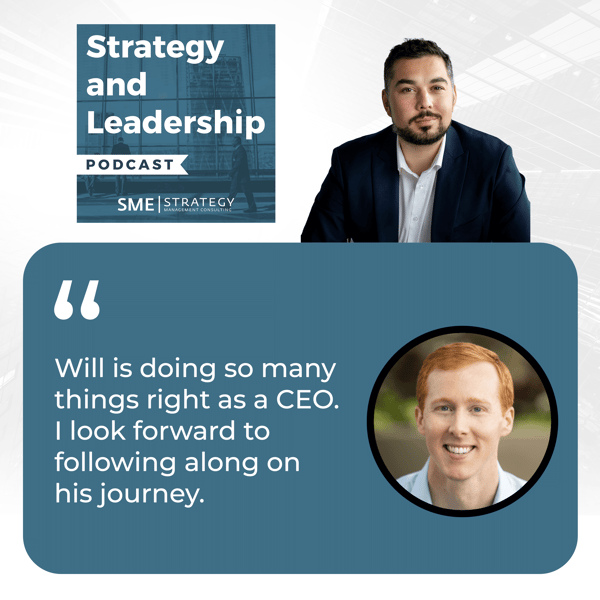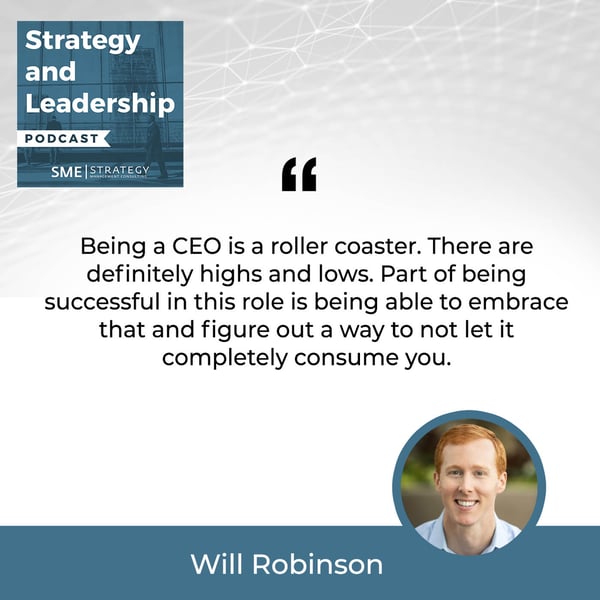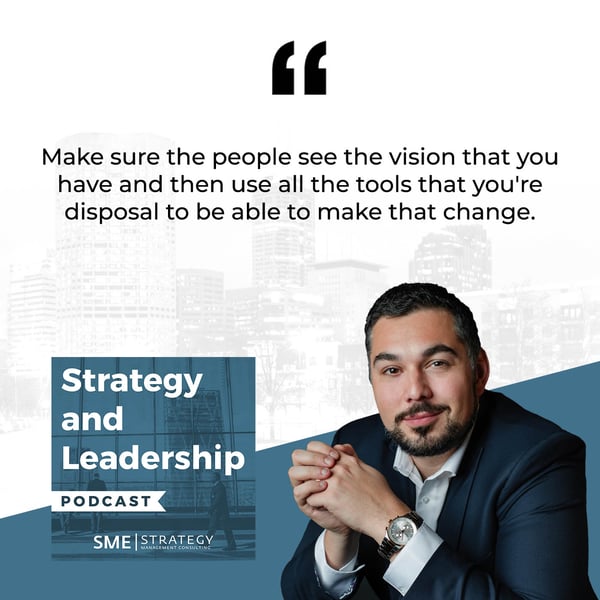Elevate Your CEO Game: Winning Strategies And AI Innovation With Will Robinson

Leading as a CEO isn't about knowing every answer; it's about fostering a culture of growth, embracing innovation, and empowering your team to excel. Join us as Will Robinson, the CEO of Encapture, unravels the challenges and triumphs faced in their journey towards innovation, leveraging AI, and transforming leadership. Throughout the episode, Will shares the journey from a legacy business model to a cutting-edge software company, discusses the art of leading transformation, and debunks the misconceptions around AI. He emphasizes that as organizations adopt AI technology, the workforce is empowered to tackle complex challenges and contribute more meaningfully, thereby enriching the workplace. Tune in to uncover the secrets of effective leadership in the digital age and discover how AI can empower businesses and individuals to thrive.
Listen on Spotify: https://open.spotify.com/episode/5NC9F7W3ZzvhppPBIREHH6?si=658cdfa69a90481e
Listen on Apple Podcasts: https://podcasts.apple.com/ca/podcast/elevate-your-ceo-game-winning-strategies-and-ai/id1202449526?i=1000628742951
---
Watch the episode here
Listen to the podcast here
Elevate Your CEO Game: Winning Strategies And AI Innovation With Will Robinson
In this episode, I get to interview Will Robinson who is the CEO at Encapture. It's fun hearing about his journey as CEO in an exciting place and emerging technology entering a business as it transforms. It’s digital transformation in a whole new space. For somebody who's only been working as a CEO for a couple of years, he has tons of great experience and actionable takeaways.
It sounds like he's building a great organization there. I hope you enjoy this episode. Be sure to check out Encapture when you have some time. If you find Will Robinson, make sure it's the one with red hair and he's the guy to talk to. Thanks for being here. I appreciate you. I will see you in the interview. Talk to you soon.

My guest is Will Robinson who is the CEO at Encapture. Will, what's happening?
Anthony, how's it going? Thanks for having me on.
I'm stoked to chat. Will, can you tell our readers a little bit about what Encapture does and who you are, then I'll ask the questions.
Encapture is a software company. We help banks process loan documents. That's the high-level 30,000-foot answer that my grandmother gets whenever she asks me what we do. Digging down in the covers, we use machine learning, which is a form of artificial intelligence to extract data out of documents, identify the doc types, and eliminate a lot of the manual data entry and the steering compared processes that happen inside these banks. If you've ever applied for a mortgage before, you've had a loan officer who may ask you for a copy of your driver's license, a couple of years' tax returns, or a bank statement. We can read through all those, calculate your income, get all that data in the right system, and make the process go a lot faster.
How did you decide to start this company?
It's a funny story. The company is old. If you look at me, you realize I have not been here the whole time but we were doing something different. I joined a few years ago as part of a growth equity investment that the company received. We transitioned from a legacy business model that was more professional services-focused into a more peer-play SaaS software business model. It's been a big journey. I have a background in financial services and tech. It's been a lot of fun but this is my first CEO gig. There’s a lot of learning as well.
Let's start there. Going through this process and shifting the nature of your role or the job, what's it been like transitioning into the CEO seat? What's your first experience like?
It's a roller coaster. There are highs and lows. Part of being successful in this role and any manager role is being able to embrace that and figure out a way to not let it consume you. I was talking with a very successful CEO or founder who's a couple of decades ahead of me in the journey. He was talking about how the biggest thing he's learned in his 30 years is navigating the roller coaster of emotions and success and failure.

Also, make sure that as a leader, you're able to show up every day with a level of energy, consistency, and focus that's required for the job because it's a unique role. It gets glamorized a lot and it's a cool role. I love being able to do it but you have to have a very specific mindset to make it. I've been here for a few years and I feel like I've seen mostly everything at this point or if it feels like that. It's been a great journey.
It's a cool situation that you've been in, at least, for me. What you've shared and what I can research online put into the organization, especially if it's an old organization that's been doing things a certain way through investment and growth, finding somebody that has the right mindset to win in that. From the beginning of our conversation, it felt like when we had a post-game conference where you’re like, “How did you do?” We forecheck, back-checked, and did all the stuff.
It gives me that like, “It's a post-grain presser for the CEO.” It sounds like you're in it. You're in the game. You're enjoying the game. I would bet it's probably in an area, domain, or technology that you like. My question is how has the experience been building the team to move forward with this new technology, new innovation, and the transformation of the business?
It's been a huge overhaul. It's the short answer. That's what I say to other leaders. If you're trying to do something big and different from what's been done, you're probably going to have to start with a new team. First, you have to start with a vision of where we going and that was a big thing for us as we had been going down a different path for years. We're doing not a 180 but a huge pivot and push in a different direction.
Getting people excited about it that have been around for a while is important. Make sure that you have the right people to do that. A lot of times, I have to use a sports analogy. If you’re the new head coach of a football team and the team has not been performing well over the last several years, you're probably not going to keep the old coaching staff. You're probably going to bring in your staff that understands your system and culture. It can help you reset.
You hope to take the players that have been there and get them bought in. Some will make it. Some won't but you got to bring in fresh players and talent that can buy into the culture and the vision. There are a lot of similarities there and it's been a journey. There are people that pretty quickly, I recognize would not be a good fit for us going forward but unfortunately, this was the hardest. There were people who were good at their jobs and probably important contributors to the company.
However, as we started down this new path, we started getting momentum and things got busy, they were not either willing or able to buy in and roll with that. Change is hard. Change requires flexibility and a growth mindset. I had a few folks that I would have loved to continue working here but they ended up opting out themselves. They said, “This is too much. I can't do it. I don't know how to do it.” That was hard to see but ultimately, on the back side of that, we're a much stronger organization. We're able to move a lot quicker and ultimately be more successful.
What was the process that you went through? I asked selfishly because we need strategic planning processes. We facilitate those types of conversations where the shift needs to be made and make sure everybody's on the same page. It’s not always coming after an investment or a significant change like that. What was the process that your teams, executive team, and the people that you are working with went through to not only the acquisition or investment shift the aim and then put all of those steps in place? Can you walk me through it without giving away any secrets?
I try to keep stuff simple. To be an effective leader, the more complex the situation, the simpler you need to keep it for everybody. Simplicity is hard to get to but it does allow folks to focus and rally around the most important things that are going to move the needle. As a leader, one thing we've learned is it’s important to keep it simple. Don't try to do everything at once. We overhauled this company.
Keep it simple. Don't try to do everything at once.
Sometimes, people say, “Are you the founder of the company?” The short answer is no but the long answer is, “If you look at what we're doing, where we are, and who we are versus where we were years ago, it's a brand new company.” That was not like a 3 months or 6 months process. That was a 2 to 2.5-year process of changing things out and being intentional, especially with the folks that I wanted to stick around and keep around, not overwhelm them with too much.
First of all, you have to keep the vision consistent because as soon as the vision starts changing, you lose a lot of trust from folks and then laying out a path and a plan where probably the first 3, 4, or 5 steps are me pushing and saying, “This is what we're going to do differently because this is the vision that we're going after.” After that, you start, hopefully, engaging your team members to start pushing alongside you, whether that's new people you're bringing in or even existing folks who know what's going on.
If they can start pushing that vision alongside, it goes a lot faster. At this point where we've been growing quickly, there are a lot of things to figure out but I've got a good enough group of people at the company that can take these problems and figure out how to problem solve so that we can move faster. It's iterative. It's not overnight. You have to keep it simple and be unwavering in the process as the leader so that people buy in and commit to it.
Are you still private equity backed?
We are.
How did you balance culture as a CEO like, “Transformation takes multiple years and we're shifting this big boat,” alongside using a dynamic technology that needs quasi-rapid adoption? It's this interesting parallel because you have to go fast but you also have to go slow. How did you manage that culturally and in your head?
Probably not as well as I should have. You're right. In some sense, we were moving fast, and in other areas, it was glacially slow. We tried to focus specifically on our product. We have this product that has been around for a while. It had been a little bit of the forgotten child in the corner here at the company. We wanted to take this product and make it our main primary focus.
We had to spend a lot of time initially adding features and capabilities, getting this thing enterprise-grade, and making it the shining star of the organization. Only until we did that could we build a good go-to-market engine around it. One thing that was hard was wanting to move fast but knowing, “As soon as I start pumping dollars into sales and marketing, if I don't have a strong product market fit with my current product, it's going to be highly inefficient and unsuccessful.”
I didn't do this perfectly. There were times that we went out and sold it. It was a bad solution. It was a bad customer. It was not our ICP. We thought, “Let's try this.” We probably didn't have the right product market fit and we learned from it. It wasn't until about 2022 that we were able to turn on the turbo boosters and say, “We've got good product market fit. We know who we're selling to and the problems we're solving. We know how to implement this. Let's go.” We're trying to keep up as an organization with our revenue to make sure that we give every customer a great experience and that we don't drop any balls.
One of the things that you had said and I knocked on winners is, “I've seen everything.” I'm like, “Just wait.” When I heard this, it was like, “Yes, you had to go through that.” This a situation that most CEOs won't unless you're a turnaround CEO. I’m not saying that the business was in a turnaround situation but you're coming in and trying to move it around.
Now that you've got a great product market fit, the right team, the right people, the right communication, and the right structure, it's like, “Let's put some gas on the fire and move it forward.” My question is, without getting too into the business, what do you see as being the things that you need to work on in your leadership? What are those next stages of growth and development that you foresee as a CEO because you might be a couple of steps ahead of a couple of people?
For me, we are coming out of the phase where I can have my hands in everything. That is how we've operated so far. I have been a part of every major decision for sure and many minor decisions. Everything from marketing collateral to our pricing strategy to which conferences we're going to attend and hiring the junior analyst, I have been very involved in that because I've had that vision of who are we going to be and where are we going.
We're at the stage approaching 60 employees where I've got to delegate that. A big thing for me is whether have I surrounded myself with great leaders. Are those leaders equipped me to be successful and autonomous where they need to be so that they can then do that with their next layer of leadership? That's where we are as an organization. We’re starting to build out a couple of layers of management, which makes me cringe to even say that. For us to achieve our goals in the next several years, I have to have the guy who's two layers below be able to make good decisions for the business and not have to come to his boss or come to me in that situation.
It'll be a new learning but it sounds like you've got a good support structure in place. For our readers, if you're going into a new place, try to surround yourself with people who have been to that place before so that you can learn from them. You don't need to learn the hard way every time but your journey is going to be different than the people around you. Don't let them tell you what to do. You have to learn that for yourself. What excites you about the space, industry, and technology? What are you looking forward to in that realm?
It's funny. We've been in this AI space for several years. The AI that we're using is natural language processing, which is reading a document, identifying it, and extracting the data. That's slightly different from what these generative AI models are like ChatGPT. However, the press exposure from that has been awesome because it's getting everybody to think, “How can I use AI in my business?”
We saw boring back office practical things at these banks, credit unions, and lenders that they know the pain. I don't think they've ever realized that AI can come in. This is not like you’re taking some high-risk bleeding-edge technology. That's been an exciting thing for us. We're able to talk to C-level folks at these banks and say, “Your board has asked you to use AI and it scares you because you don't even know what that means.”
Let's go through some boring practical places that you can put in AI. You can get a win. You can start leveraging the power of it and truly get some business value out of it with some of the automation that we bring. You don't have to necessarily launch a chatbot on your website that's going to sign people up for a new credit card. That's not where you have to start.
Let's go through some really boring practical places that you can put in AI. Now you can get a win, you can start leveraging the power of it and truly, get some business value out of it.
When I was thinking about processing through that, I think of the selling framework, like product-aware, solution-aware, or problem-aware. I see these people that are like, “We need to use AI,” but there's a disconnect between it. There's AI and the use case for AI in banking situations, especially in those types of industries. We talk about glacially slow. It's the way we've always done things. A few years ago, you couldn't even get a DocuSign sent over for a mortgage. You had a wet signature.
Now, you're asking people to use artificial intelligence or robots to scan something for you to cut down your compliance time by 90%. I don't know what it is but it's probably pretty close. You have these different generational people who have been used to doing it in a certain way. There are unknown tools and then you also have industry forces that are like, “How can we maximize profit to the greatest extent?”
The other kind of thing I thought about was a few years ago, they talked about robots coming and taking away manual labor but I don't think people thought about robots in the sense of technology robots. They thought of this kind of robot. It's interesting how your organization and other organization is disrupting payments, labor, and major industries. That sounds like a very cool place to be.
Ripping off that, Anthony, an assumption that's made is that AI is going to come and replace or kill off jobs. That's overblown. Even our AI, if you put us in, in theory, you need fewer people reviewing documents, checking data, and doing manual data entry. However, what we see is that these banks use this AI as almost a productivity enhancer for their existing staff.
Those folks can be a lot more productive in their day working on higher-value tasks and handling more complex issues. There's this false narrative sometimes around AI that we're in this zero-sum game and if AI wins, people are labor lose. What's going to happen is you're going to push forward this frontier of productivity and allow the staff that do exist in an organization to do a lot more and that organization can push forward as well.
There's this false narrative sometimes around AI that we're in this zero-sum game, and if AI wins, people are labor lost. But what's really going to happen is you're going to push forward this frontier of productivity.
It's going to be a big enabling tool and there's a bit of fear-mongering going on around it that is overblown. As someone who's been in this space and has been putting this stuff in for years, there are very few situations where we've come in and they've fired half the team. A lot of times, they don't even have the staff that they need in the first place. They've had a struggle hiring.
Now, they don't have to try to backfill those roles or reallocate folks to do the higher-purpose stuff. That's what's exciting about AI in general. Even though I am in my business, I’m thinking, “How do we use AI internally to run the business more efficiently?” I wouldn't think of it as how I may cut costs or get reduced staff. It's more about how I make my current staff twice as productive and allow them to do things that they can't do now.
It will be an interesting and evolving space even if you are on the technological cutting edge bleeding edge, which I am certainly not but the keyword that I want to bring up that you shared was AI-enabled. People hear it from different places in different ways but I think of Iron Man. Iron Man is going off and doing his thing. He then asks JARVIS, his AI, to solve something quickly while he's doing something else.
AI is your co-pilot to support you while you're doing all of those things so that as a bank, you spend more time with customers. AI cannot do that. Spend time supporting your colleagues and doing complex problems. You can delegate and optimize the low-value stuff within a team. You hit it on the head. People are already short-staffed doing low-value stuff.
How can you use tools like that to support people in any organization doing the high-value stuff? Will, as we finish up here, what would you recommend to our leaders as they are looking at whether that's AI implementing new technologies or whether that's in leadership, taking on a new role, and jumping in head first?
I'll answer your AI first quickly. There's a lot of options out there. Think about what problem you need to solve and then go find the solution to the problem. Don't go find a cool tool and then try to fit it in the org. That's my quick add on that. If you're a new leader, I would spend a little bit of time building your identity as a leader. If you've been an individual contributor before and now, you’re a leader and you’re responsible for people, there's a whole new set of skills that you're going to be exercising around helping others prioritize certain initiatives.
If you're a new leader, spend a little bit of time building your own identity as a leader.
You may be called on to hire folks or set a strategy. You're certainly in a role where you're expected to be building culture. If you don't even know what culture you're building, it would be a good place to start. “This organization I'm in, I'm a leader even if it's just three people. What are the cultural values we have at the organization? As a leader, am I embodying those so that I can provide operating leverage to the people below me so they can be super successful in their roles?”
You can do that by listening to podcasts or reading leadership books. There's a lot to do but you need to spend some time to say, “Who am I going to be as a leader? What are my core values? How am I going to manage? How am I going to communicate with my team? What do I want them to expect of me?” That'll allow you to be a lot more intentional and get better results out of the folks that you're leading.
You've been at this for a few years but you’ve spoken like a true veteran, Will. I appreciate you sharing in this episode. It’s a super fun conversation. I appreciate you taking the time. I'm super excited to see what your company comes up with in the future. Where can people connect with you and learn about Encapture? Let's say goodbye for now.
Encapture.com is our site. You can hit me up on LinkedIn at Will Robinson. I appreciate you, Anthony. Thanks so much for having me.
It was my pleasure. Folks, one of the things I'm taking away from Will sharing is creating the identity that you want. Both identity as a CEO and identity as a company and charting that future. Make sure that you have the right people at the table, people see the vision, and you've got that communication. Also, use the tools that are at your disposal to be able to make that change.

Whether it's AI or something else, being able to make that future a reality both in terms of an individual, as an individual leader, or as an organization is critical. There are a lot of great lessons here. I appreciate you reading. Will, thank you again for being our guest. I hope everybody has a lovely day, weekend, month, or year. I'll see you next time.
Important Links
- Encapture
- Will Robinson - LinkedIn
About Will Robinson

Will Robinson is the CEO at Encapture, a high-growth SaaS platform that helps banks automatically extract important information from documents. Launched 20 years ago in Dallas, Texas, Encapture helps companies such as Wells Fargo, Frost Bank and Truist save time and money by using machine learning to process large amounts of data.
Since joining the fast-growing company in 2019, Will has assembled a strong team of individuals that shares his passion for fintech and AI banking, ensuring sustainable growth, achieving innovative excellence and tripling revenue. He leads Encapture with an emphasis and passion for company culture and setting a high standard of excellence for a team that is constantly learning and excelling.
Encapture’s user-friendly automation empowers banks to save valuable time and reduce compliance risk by processing documents efficiently and accurately in an easily accessible format. Instead of getting bogged down with quarterly compliance and regulatory audits, they can put a greater focus on delivering an exceptional customer experience and boosting satisfaction. Best of all, no technical expertise is required to utilize and reap the benefits of the Encapture platform thanks to the power of sophisticated machine learning AI.
Before joining Encapture, Will held several executive management positions at Dynata, the largest market research data company with over 3,000 clients in 40+ countries. While at Dynata, he led the company’s global product development teams and pioneered the use of automated research and integrated data within the industry. Prior to Dynata, Will was an investment professional at The Carlyle Group, one of the world’s largest and most successful investment firms. He helped to source, conduct due diligence and manage technology and business services investments on behalf of the firm’s $14 billion US buyout fund. He also worked closely with Carlyle’s portfolio companies to execute various financial and strategic initiatives.
Will began his career in the investment banking division of J.P. Morgan. He received a Bachelor of Business Administration from Baylor University, where he was a Carr P. Collins Scholar. Today, he lives in Dallas with wife and two sons, and is involved in leadership roles at several community organizations. For more information, visit https://encapture.com


